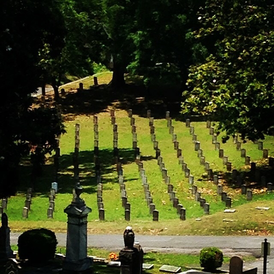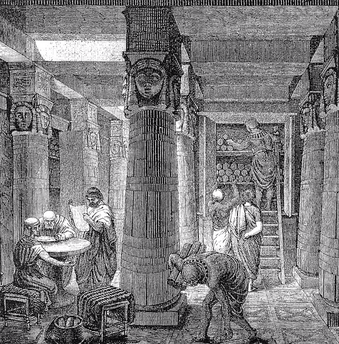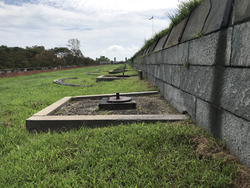 By Sam Burnham @C_SamBurnham On this Memorial Day we honor those who gave the ultimate sacrifice for their families, friends, and homes. That sacrifice was given in a faith in the future, that generations to come will enjoy the blessings of liberty and the continued history of their homeland. For such a selfless act of sacrifice, a simple "thank you" will never be enough. Let us pause today to remember them. But let us also be ever diligent in our defense of what their sacrifice has given us. May we be stewards of those principles. May we never let their sacrifice to be in vain. And may we never forget why we still have such blessings. So today we honor them with our memories and commit to defend daily that which they died for.
0 Comments
By Sam Burnham @C_SamBurnham We are once again seeing a spat surrounding the display of Confederate flags in Georgia. This time the flags, which supporters are often told only belong in a museum, are reportedly being forced from a museum.
The Nash Farm Battlefield Museum has announced, in a statement on its Facebook page, that it will be closing permanently as of June 1st. The reason cited is that Henry County District 2 commissioner, Dee Clemmons, has ordered the removal of all Confederate flags from the property, including the museum and gift shop. According to members of the Friends of Nash Farm Battlefield, the group had already removed a Second National flag from the the flag pole in front of the museum as well as an entrenchment demonstration that had been installed as an educational tool. According to an additional statements on the Nash Farm Battlefield Facebook page, Clemmons was invited as a guest at an awards ceremony the Georgia Civil War Commission was hosting inside the museum. While visiting the site for this event, Commissioner Clemmons made a demand to Cassie Barrow, past president of the group, that all Confederate flags be removed from the museum to avoid offending anyone. What is even more troubling is that Clemmons is also reportedly demanding that the word "battlefield" be removed from the park's name citing that no battle took place there and that the land itself has no historic connection to the war. According to the website of the Civil War Trust, the Nash Farm was the site of the August 20, 1864 battle known as Kilpatrick's Raid, the largest cavalry breakthrough saber charge in Georgia's history. Multiple attempts to contact Commissioner Dee Clemmons were unsuccessful and she did not respond to any of my messages. Commissioner Clemmons' District 2 is home to the Nash Farm Battlefield Park. This represents the bulk of the information that is available to me as I write this. I will clarify that the remainder of this post is my opinion. It is what I have come to believe in light of the available information. What follows is commentary, not news. I'd like to start out by saying that in nearly 40 years of visiting Civil War sites, museums, battlefields, cemeteries, etc, I have yet to encounter a Civil War museum that does not display Confederate flags. The purpose of such a museum is to tell the story of the battle or event that is being commemorated there. This involves telling the stories of both sides involved. It is unrealistic to expect such a museum to not display flags and emblems of both sides. I have never seen a museum censor the history they portray like Commissioner Clemmons is reportedly demanding the Nash Farm to do. Once you begin to censor history, you can effectively rewrite it to say what you want it to say. That is a very dangerous precedent for an educational and cultural center such as the Nash Farm Battlefield Museum. Next we need to discuss the reported statements Commissioner Clemmons made about the historic significance of the battlefield. Insisting that this property is not a battlefield and that the word battlefield be removed from the park's name and signage suggests that the commissioner may be trying to keep certain areas of the park from being redeveloped as she sees fit, rather than strictly adhering to the recommendations of historians and preserving historically significant areas. It suggests that someone may not want to be bound by the need for preservation at the Nash Farm Battlefield. If this were the case, it could raise serious ethical questions about such changes. And I don't want to ignore the economic impart of tourism in Georgia. Much of those tourism dollars come from historic sites, especially pertaining to the Atlanta Campaign and The March to the Sea. Events at and near Nash Farm Battlefield played a pivotal role in the Atlanta Campaign and helped lead to the fall of Atlanta. Censoring this history robs students and adults alike of a powerful educational resource that interprets the history of our state and teaches us about ourselves and the land we call home. I can't think of any excuse that would justify censoring the history in the exhibits in the museum of The Nash Farm Battlefield. There is no other historic site in our state, or neighboring states, that is held to this dangerous standard. It makes me worry about what might be next. What will Commissioner Clemmons find offensive next? What will have to be censored next? And in seven years of operation, the only documented case of a museum visitor being offended that I've found was Commissioner Clemmons on the night of the Georgia Civil War Commission's awards ceremony. The flags need to stay, the historians, not agenda-driven politicians, need to determine what is in the museum, and the battlefield must be preserved. This should be the only acceptable outcome of this spat.  The Great Library of Alexandria, O. Von Corven The Great Library of Alexandria, O. Von Corven By Sam Burnham @C_SamBurnham Sometime in the 3rd century B.C., The Macedonians established the legendary Library at Alexandria. This library was one part of the "Seat of the Muses," a major center of learning in the ancient world. But it was more than just books. This center included schools, lecture halls, centers for music and art. It was a center of culture as much as anything. While any other centers of learning and culture had risen by that time, the burning of the Great Library is still seen as a symbolic loss of knowledge and culture. Over 2000 years later, bibliophiles and intellectuals still look upon the destruction with a sense of mourning.  Ancient Manuscripts at the Library in the City of Timbuktu. Evan Schneider/AFP/Getty Images Ancient Manuscripts at the Library in the City of Timbuktu. Evan Schneider/AFP/Getty Images A few centuries later on the same continent, scholars came together to found the great Islamic center of learning and culture of Timbuktu, in modern day Mali. In 2012, the libraries of Timbuktu became a target of al-Qaida backed Islamist militants who believed the manuscripts to be idolatrous. Librarian Abdel Kader Haidara defied the terrorists and hatched a plot and smuggled 350,000 manuscripts out of the city and hid them in safer locations in the region.  Luis Soriano Making a Stop in Rural Colombia By Acción Visual/Diana Arias - Luis Soriano Making a Stop in Rural Colombia By Acción Visual/Diana Arias - In rural Colombia, a grade school teacher saw people with little to no access to books. So Luis Soriano started a travelling library with a collection of 70 books and two burros. He loaded books on the animals and then traveled to the towns in the region and allowed the people to check out books. Soriano has been accosted by bandits and even lost a leg in an accident involving one of his burros but that didn't stop him from carrying out the wok of the Biblioburros. I've shared these stories because I believe we are finding ourselves in an age that doesn't see them importance of libraries. Librarians are nothing more than the keepers of the books - archaic devices that, like the American industrial worker, have been replaced by technology. The internet and electronic devices have brought us into an enlightened age where little old ladies wearing their hair in buns try their best to keep dust off the stacks of unused books.
Libraries are still centers of our culture. They obviously house our books. But they also hold music, video, audio visual equipment, archived periodicals dating back centuries, even works of art on display for the public. Libraries drive our literacy and provide opportunity for people to research topics and fact check ideas themselves. Our libraries offer computers with web access for people who don't have them at home. Some libraries even offer seeds that can be replaced with seeds from next generation harvested plants. For over 2000 years, librarians have stayed ahead of the curve, keeping their institutions on the rising trends. Long before schools had librarians who knew every detail about every piece of technology in the building. And if a new way to access information comes along, these are the people who find ways to harness them and make them available to their patrons. Librarians keep the books and they do that well. But if we diminish them to that alone, we do them a disservice and we risk cheating ourselves out of one of the greatest resources available to us today. Their libraries. |
Sam B.Historian, self-proclaimed gentleman, agrarian-at-heart, & curator extraordinaire Social MediaCategories
All
Archives
November 2022
|





 RSS Feed
RSS Feed
